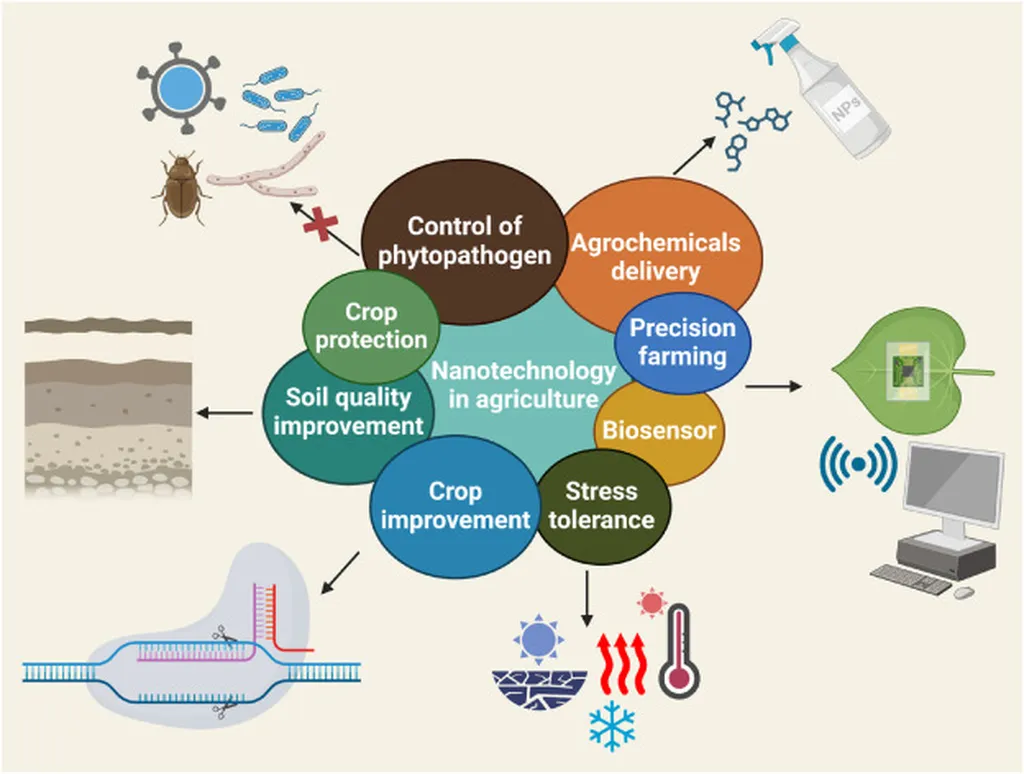In the face of climate change, global agriculture is under siege, with nutrient depletion and crop yield losses threatening food security. But a glimmer of hope emerges from an unlikely source: nanoparticles. A recent review published in the journal *Plant Stress* (translated from Chinese as “植物应激” or “Zhiwu Yingji”) explores how these tiny powerhouses could revolutionize sustainable agriculture by enhancing nutrient use efficiency and resilience to environmental stresses.
Led by Yingfen Yang from the Academy of Science and Technology at Chuxiong Normal University in China, the review delves into the potential of nanoparticles (NPs) to transform plant nutrition and stress management. “Nanoparticles offer a promising solution by enhancing plant nutrient uptake and stress tolerance through their unique physicochemical properties,” Yang explains. This is not just about bigger yields; it’s about smarter, more efficient agriculture that can withstand the pressures of a changing climate.
The review examines various types of nanoparticles—carbon-based, metal-based, and silicon-based—and their applications through foliar sprays, soil amendments, or seed priming. These methods can improve nutrient solubility, root development, and crop productivity under abiotic stresses like drought, salinity, and heavy metal toxicity. Imagine a future where crops can thrive in arid regions or contaminated soils, thanks to the precision of nanotechnology.
One of the most compelling aspects of this research is the dual role of nanoparticles. They not only enhance the bioavailability of essential macro and micronutrients but also mitigate stress via antioxidant activity and osmotic regulation. “Nano-fertilizers also optimize nutrient use efficiency through controlled release, reducing environmental losses,” Yang adds. This controlled release mechanism is a game-changer, ensuring that nutrients are delivered exactly when and where they are needed, minimizing waste and environmental impact.
The commercial implications for the energy sector are significant. As the global population grows, so does the demand for food and the resources required to produce it. Efficient nutrient use and stress-resilient crops can reduce the energy and water footprint of agriculture, making the sector more sustainable and cost-effective. This could lead to lower operational costs for farmers and a more resilient food supply chain, which is crucial for energy-intensive industries that rely on stable food sources.
However, the path to large-scale adoption is not without challenges. Safety, regulatory frameworks, and economic viability are all hurdles that need to be addressed. “Further research is needed to ensure safe, sustainable implementation,” Yang emphasizes. This calls for collaboration between scientists, policymakers, and industry leaders to create guidelines and standards that foster innovation while protecting ecosystems.
The review published in *Plant Stress* highlights the transformative potential of nanoparticles in agriculture. As climate change continues to pose threats to global food security, nanotechnology offers a beacon of hope. By enhancing nutrient use efficiency and abiotic stress resilience, nanoparticles could shape the future of sustainable agriculture, ensuring food security for generations to come. The journey is just beginning, but the promise is immense.

